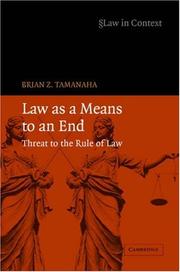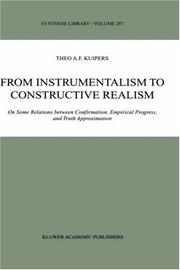| Listing 1 - 10 of 22 | << page >> |
Sort by
|
Book
ISBN: 3969751217 Year: 2010 Publisher: Paderborn : mentis Verlag,
Abstract | Keywords | Export | Availability | Bookmark
 Loading...
Loading...Choose an application
- Reference Manager
- EndNote
- RefWorks (Direct export to RefWorks)
Für viele stellt das Instrumentalisierungsverbot, wonach man andere Menschen nie bloß als Mittel behandeln darf, eine fundamentale moralische Wahrheit dar. Dieses Buch ist der Versuch, diese Ansicht näher zu fassen und zu begründen. Das Instrumentalisierungsverbot spielt nicht nur in unserer Alltagsmoral, sondern auch in moraltheoretischen Diskussionen eine wichtige Rolle. Verschiedenste Praktiken werden mit der Begründung als unzulässig kritisiert, dass mit ihnen Menschen instrumentalisiert würden. Doch was heißt es, die anderen bloß als Mittel zu behandeln? Es besteht, so wird in diesem Buch argumentiert, ein Zusammenhang zwischen unzulässiger Instrumentalisierung und Verletzung der Würde von Personen. In der Explikation des Würdebegriffs wird dieser Zusammenhang entfaltet. Die unzulässige Instrumentalisierung von Personen verletzt in bestimmten Fällen deren Würde, in anderen Fällen Ansprüche, die in der Würde von Personen begründet sind. Die Würde von Personen wird dabei als Anspruch auf Selbstachtung gefasst. Selbstachtung wird nicht im Sinne der Selbstwertschätzung verstanden. Im Blick steht vielmehr ein normatives Verständnis von Selbstachtung, wonach Personen ein Leben in Selbstachtung führen, sofern ihr Selbstverfügungsrecht von anderen und ihnen selbst geachtet wird. Der Anspruch auf Selbstachtung wird als Anspruch darauf begriffen, über wesentliche Bereiche des eigenen Lebens verfügen zu können. Diese Überlegungen zu Würde und Selbstachtung werden moraltheoretisch eingeordnet und abschließend auf paradigmatische Fälle der praktischen Ethik angewendet, bei denen es um die Instrumentalisierung von Menschen geht.
Book
ISBN: 080141511X 9780801415111 Year: 1982 Publisher: Ithaca ; London: Cornell university press,
Abstract | Keywords | Export | Availability | Bookmark
 Loading...
Loading...Choose an application
- Reference Manager
- EndNote
- RefWorks (Direct export to RefWorks)
Law --- Instrumentalism (Philosophy) --- History --- Philosophy --- Philosophy. --- History. --- Instrumentalism (Philosophy). --- Law - United States - History --- Law - Philosophy

ISBN: 0226727262 9780226727264 Year: 1994 Publisher: Chicago (Ill.) : University of Chicago press,
Abstract | Keywords | Export | Availability | Bookmark
 Loading...
Loading...Choose an application
- Reference Manager
- EndNote
- RefWorks (Direct export to RefWorks)
Biology --- Science --- Instrumentalism (Philosophy) --- Philosophy --- Philosophy. --- Instrumentalism (Philosophy). --- Biology - Philosophy --- Science - Philosophy
Book
ISBN: 022651367X Year: 2018 Publisher: Chicago : University of Chicago Press,
Abstract | Keywords | Export | Availability | Bookmark
 Loading...
Loading...Choose an application
- Reference Manager
- EndNote
- RefWorks (Direct export to RefWorks)
Law relies on a conception of human agency, the idea that humans are capable of making their own choices and are morally responsible for the consequences. But what if that is not the case? Over the past half century, the story of the law has been one of increased acuity concerning the human condition, especially the workings of the brain. The law already considers select cognitive realities in evaluating questions of agency and responsibility, such as age, sanity, and emotional distress. As new neuroscientific research comprehensively calls into question the very idea of free will, how should the law respond to this revised understanding? Peter A. Alces considers where and how the law currently fails to appreciate the neuroscientific revelation that humans may in key ways lack normative free will-and therefore moral responsibility. The most accessible setting in which to consider the potential impact of neuroscience is criminal law, as certain aspects of criminal law already reveal the naiveté of most normative reasoning, such as the inconsistent treatment of people with equally disadvantageous cognitive deficits, whether congenital or acquired. But tort and contract law also assume a flawed conception of human agency and responsibility. Alces reveals the internal contradictions of extant legal doctrine and concludes by considering what would be involved in constructing novel legal regimes based on emerging neuroscientific insights.
Law and ethics. --- Free will and determinism. --- Neurosciences. --- cognitive psychology. --- deontology. --- determinism. --- folk psychology. --- free will. --- instrumentalism. --- law. --- moral responsibility. --- neuroscience. --- non-instrumentalism.
Book
ISBN: 3495474471 Year: 1983 Volume: 3, 2 Publisher: Freiburg : K. Alber,
Abstract | Keywords | Export | Availability | Bookmark
 Loading...
Loading...Choose an application
- Reference Manager
- EndNote
- RefWorks (Direct export to RefWorks)
Law --- Law --- Instrumentalism (Philosophy). --- Droit --- Droit --- Instrumentalisme --- History. --- Philosophy. --- Histoire --- Philosophie
Multi
ISBN: 9780521881357 9780521707626 9780511802577 9781139129541 1139129546 0511802579 9780511479335 0511479336 9780511477812 0511477813 0521881358 0521707625 1107199662 1283330083 9786613330086 1139134590 113913339X Year: 2008 Volume: *13 Publisher: Cambridge Cambridge University Press
Abstract | Keywords | Export | Availability | Bookmark
 Loading...
Loading...Choose an application
- Reference Manager
- EndNote
- RefWorks (Direct export to RefWorks)
George Berkeley (1685-1753) was a university teacher, a missionary, and later a Church of Ireland bishop. The over-riding objective of his long philosophical career was to counteract objections to religious belief that resulted from new philosophies associated with the Scientific Revolution. Accordingly, he argued against scepticism and atheism in the Principles and the Three Dialogues; he rejected theories of force in the Essay on Motion; he offered a new theory of meaning for religious language in Alciphron; and he modified his earlier immaterialism in Siris by speculating about the body's influence on the soul. His radical empiricism and scientific instrumentalism, which rejected the claims of the sciences to provide a realistic interpretation of phenomena, are still influential today. This edition provides texts from the full range of Berkeley's contributions to philosophy, together with an introduction by Desmond M. Clarke that sets them in their historical and philosophical contexts.
Filosofia (história) --- Philosophy --- Mental philosophy --- Humanities --- Philosophy. --- History. --- Empiricism. --- Instrumentalism (Philosophy) --- Science --- Religion --- Religion and science. --- Arts and Humanities
Book
ISBN: 9781496205131 9781496215925 9781496215932 9781496215949 149621594X 1496205138 1496215923 Year: 2019 Publisher: Lincoln
Abstract | Keywords | Export | Availability | Bookmark
 Loading...
Loading...Choose an application
- Reference Manager
- EndNote
- RefWorks (Direct export to RefWorks)
Contra Instrumentalism questions the long-accepted notion that translation reproduces or transfers an invariant contained in or caused by the source text. This “instrumental” model of translation has dominated translation theory and commentary for more than two millennia, and its influence can be seen today in elite and popular cultures, in academic institutions and in publishing, in scholarly monographs and in literary journalism, in the most rarefied theoretical discourses and in the most commonly used clichés. Contra Instrumentalism aims to end the dominance of instrumentalism by showing how it grossly oversimplifies translation practice and fosters an illusion of immediate access to source texts. Lawrence Venuti asserts that all translation is an interpretive act that necessarily entails ethical responsibilities and political commitments. Venuti argues that a hermeneutic model offers a more comprehensive and incisive understanding of translation that enables an appreciation of not only the creative and scholarly aspects of what a translator does but also the crucial role translation plays in the cultural and social institutions that shape human life.
Traduction --- Instrumentalisme --- Philosophie --- Philosophie. --- Instrumentalisme. --- Philosophy of science --- Translation science --- Translating and interpreting --- Instrumentalism (Philosophy) --- Philosophy --- Pragmatism --- E-books --- Philosophy.

ISBN: 9780521689670 0521869528 9780521869522 0521689678 9780511511073 1107171342 0511250193 051125072X 0511319169 0511511078 1280702826 0511249136 0511249683 9780511250729 0511248059 9780511248054 9780511249136 9781107171343 9781280702822 9780511250194 9780511319167 9780511249686 Year: 2006 Publisher: Cambridge New York Cambridge University Press
Abstract | Keywords | Export | Availability | Bookmark
 Loading...
Loading...Choose an application
- Reference Manager
- EndNote
- RefWorks (Direct export to RefWorks)
The contemporary US legal culture is marked by ubiquitous battles among various groups attempting to seize control of the law and wield it against others in pursuit of their particular agenda. This battle takes place in administrative, legislative, and judicial arenas at both the state and federal levels. This book identifies the underlying source of these battles in the spread of the instrumental view of law - the idea that law is purely a means to an end - in a context of sharp disagreement over the social good. It traces the rise of the instrumental view of law in the course of the past two centuries, then demonstrates the pervasiveness of this view of law and its implications within the contemporary legal culture, and ends by showing the various ways in which seeing law in purely instrumental terms threatens to corrode the rule of law.
Rule of law --- Law --- Legal positivism --- Instrumentalism (Philosophy) --- History --- Philosophy --- Legal instrumentalism --- Legal positivism. --- Pragmatism --- Legal neopositivism --- Neopositivism in law --- Jurisprudence --- Positivism --- Supremacy of law --- Administrative law --- Constitutional law --- History. --- Philosophy. --- General and Others --- Rule of law - United States - History --- Law - United States - Philosophy

ISBN: 0792360869 9048153697 9401716188 Year: 2000 Publisher: Dordrecht Kluwer
Abstract | Keywords | Export | Availability | Bookmark
 Loading...
Loading...Choose an application
- Reference Manager
- EndNote
- RefWorks (Direct export to RefWorks)
Surprisingly, modified versions of the confirmation theory (Carnap and Hempel) and truth approximation theory (Popper) turn out to be smoothly sythesizable. The glue between the two appears to be the instrumentalist methodology, rather than that of the falsificationalist. The instrumentalist methodology, used in the separate, comparative evaluation of theories in terms of their successes and problems (hence, even if already falsified), provides in theory and practice the straight road to short-term empirical progress in science ( à la Laudan). It is also argued that such progress is also functional for all kinds of truth approximation: observational, referential, and theoretical. This sheds new light on the long-term dynamics of science and hence on the relation between the main epistemological positions, viz., instrumentalism (Toulmin, Laudan), constructive empiricism (Van Fraassen), referential realism (Hacking, Cartwright), and theory realism of a non-essentialist nature (constructive realism à la Popper). Readership: Open minded philosophers and scientists. The book explains and justifies the scientist's intuition that the debate among philosophers about instrumentalism and realism has almost no practical consequences.
Instrumentalism (Philosophy) --- Realism --- Science --- -Natural science --- Science of science --- Sciences --- Empiricism --- Philosophy --- Universals (Philosophy) --- Conceptualism --- Dualism --- Idealism --- Materialism --- Nominalism --- Positivism --- Rationalism --- Pragmatism --- Realism. --- Philosophy. --- -Philosophy --- Instrumentalism (Philosophy). --- Normal science --- Philosophy of science --- Philosophy and science. --- Epistemology. --- Modern philosophy. --- Logic. --- Philosophy of Science. --- Modern Philosophy. --- Argumentation --- Deduction (Logic) --- Deductive logic --- Dialectic (Logic) --- Logic, Deductive --- Intellect --- Psychology --- Reasoning --- Thought and thinking --- Modern philosophy --- Epistemology --- Theory of knowledge --- Science and philosophy --- Methodology
Book
ISBN: 0333229606 Year: 1977 Publisher: London Macmillan
Abstract | Keywords | Export | Availability | Bookmark
 Loading...
Loading...Choose an application
- Reference Manager
- EndNote
- RefWorks (Direct export to RefWorks)
Instrumentalism (Philosophy) --- Science --- -Natural science --- Science of science --- Sciences --- Philosophy --- Pragmatism --- Dewey, John --- Philosophy. --- -Philosophy --- Instrumentalism (Philosophy). --- Normal science --- Philosophy of science --- Dewey, John, --- Tu-wei, --- Tu-wei, Yüeh-han, --- Dyui, --- Dʹi︠u︡i, Dzhon, --- Dyuʼi, G'on, --- Дьюи, Джон, --- ديوى، جون، --- 杜威, --- Dīvīy, Jān, --- ديويي، جان --- Dīwʼī, Jān, --- Dīwiʼī, Jān, --- ديوئى، جان --- Diyūʼī, Jān, --- Dyūwi, Jon, --- Dyūi, Jon, --- デューウィジョン, --- デューイジョン, --- ジョン・デューウィ, --- ジョン・デューイ,
| Listing 1 - 10 of 22 | << page >> |
Sort by
|

 Search
Search Feedback
Feedback About UniCat
About UniCat  Help
Help News
News